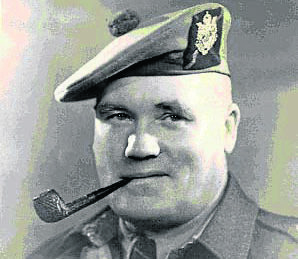A Victoria Cross hero who hailed from the Highlands – and became Canada’s most decorated soldier – is to be honoured a century after his bravery saved countless lives.
Captain John MacGregor was born in February 1889 at Cawdor, near Nairn, and was brought up on a croft at Newlands of Urchany, attending Nairn Academy before leaving and training as a master carpenter and stonemason.
He also joined Nairn Garrison Artillery, but decided to emigrate to Canada after his father died.
In 1909 he crossed the Atlantic to Montreal and worked as a carpenter, mostly on the railways, moving west as the work moved west.
He finally ended up in the remote north-west, but on hearing Britain had gone to war with Germany he donned his snow shoes and set off over mountains, taking almost a week to finally sign up, becoming Private John MacGregor of the 11th Canadian Mounted Rifles.
He served time in Ypres and the Somme, and was quickly promoted as many senior officers were killed on duty.
At Vimy Ridge the soldier known to his comrades as Jock led a battle and captured a German ‘gun nest’, saving many lives after the troops surrendered.
He was awarded the Distinguished Conduct Medal, the highest award short of the Victoria Cross that may be made to a soldier below the rank of Warrant Officer.
The citation read: “For conspicuous gallantry and devotion to duty. He single handed captured an enemy machine gun and shot the crew, thereby undoubtedly saving his company from many casualties.”
Following an attack in No Man’s Land in 1917 he was awarded the first of his Military Crosses.
It was his actions in September 1918 which led to him being awarded the VC, leading various charges near Camrai, killing many enemy soldiers and capturing a number of prisoners, while securing prominent positions for further advances – and on one occasion he single-handedly went out in open fire to reach the enemy.
At Buckingham Palace, on February 26, 1919, the King decorated Capt MacGregor with the Victoria Cross and also a bar to his Military Cross.
He returned to Canada after the war and married a nurse, Ethel Flower, who had treated him after he battled a harbour fire in Prince Rupert. They had two sons.
He died of cancer in June 1952.
The Department for Communities and Local Government announced in 2014 that a Commemorative Paving Stone would be laid on the 100th anniversary of each solder who was awarded the VC during WWI.
Lt Col Bob Towns, president of the Nairn British Legion, said: “As a result of a presentation in the Nairn Legion I took an interest in his story subsequently visited his grave and place of residence in Powell River in 2012.
“Always part of the action, he was a very brave man who deserves this recognition one hundred years on. “
